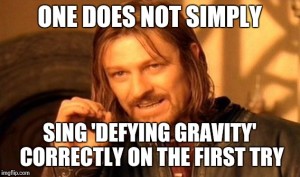It’s what we fear more than anything as singers. Okay, maybe not anything, but it can really make a performance go in an unwanted direction.
My voice has cracked in audition rooms and in front of paying audiences.
I was fortunate enough to read some online commentary about it thereafter. People can be mean, y’all.*
*(This is one reason why I have a hard time with the schadenfreude-fest some people have with youtube singer fail videos. Singing is hard, and as fellow singers, we need to understand that and give each other a break.)
Cracking is frustrating, and many times we’re mystified as to why it’s happening.
So, here’s some help so that you can sort out what may be going on.
- Abrupt or static support.
- Sometimes we engage the abdominals too quickly and rigidly when we sing. This basically punches the closed vocal folds that then respond by adding tension. Depending on the pitch we’re singing, a release of certain muscles is needed, and we’re yodeling. See here for a brief description of dynamic support.
- Trying to directly control the larynx position. Let the larynx suspend and hang out and just respond to the air coming through. Trying to focus on it or keep it in a certain location leads to brittle, crackable, and inflexible sounds.
- Uncontrolled constriction or vocal tract shape.
- The other thing that’s hard to learn is to let the constrictor muscles relax while we move a lot of vocal energy through our head. This takes practice. Also, the way we shape the vocal tract (the space from the folds to your lips) has a huge impact on this–too many variables here to describe.
- Choice of vowel.
- Not all vowels are singable in every mode or gear of the voice. For example, it’s not really possible to sing a pure [u] (oo) vowel in overdrive or edge (what some might call belting or a calling voice). That’s why we hear a lot of singers switch to an [o] (oh) vowel when they’re stuck in overdrive.
- “I love yoooohhhh!”
- Same thing with [i] (ee). It has to move toward an [ɪ] (ih like sit) in edge in order to sound like (ee) as in “me” or “see.”
- “It’s gonna be may.”
- “You’re gonna looo-o-o-o-o-oooooo-o-o-o-o-vah, (gasp inhale), maaaaaaaayyyyyy.”
- If we insist on singing the vowel as we say it and it doesn’t agree with the mode or gear, we’re going to yodel because the vowel itself wants to tend toward it’s home base. [u] will be neutral or curbed, for example.
- Not all vowels are singable in every mode or gear of the voice. For example, it’s not really possible to sing a pure [u] (oo) vowel in overdrive or edge (what some might call belting or a calling voice). That’s why we hear a lot of singers switch to an [o] (oh) vowel when they’re stuck in overdrive.
- Time to grow. Your voice is part of you and needs time to coordinate and grow. Singing in certain modes requires oppositional muscles in the larynx to coordinate and cooperate. This takes time to coalesce and for your body–neurons, muscles, mind, understanding– to make the connections. Work with a knowledgable teacher, and commit to practicing and staying in the game.
